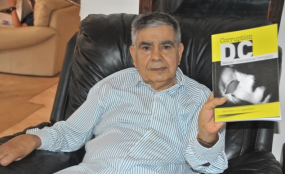When stroke victims are treated within the first four hours of an attack, they are more likely to recover completely or to face only limited disability. A new brain stroke unit in Cairo is designed to quickly treat more patients, but operating this unit will take the work of highly trained and skilled Egyptian healthcare professionals.
Located at the Kasr El Ainy hospital, this unit will play a vital role in improving health in the city, given that stroke is the second leading cause of death in Egypt and a major cause of disability globally – particularly in developing countries such as Egypt .
GE Healthcare, which is equipping the unit with dozens of advanced respiratory care and patient monitoring devices, also is providing crucial training regarding the operation of this equipment to doctors, technicians, nurses and biomedical professionals. This will help optimize use of the new technologies and build local capabilities and know-how among Egyptian healthcare professionals.
With the average treatment cost of stroke reaching EGP 40,000; the newly launched brain stroke unit at Kasr El Ainy Hospital is one of the largest free-public units to serve a wide range of stroke patients across the Middle East. The new unit will have 34 beds serving approximately 50,000 stroke patients .
With the combination of expert tools, advanced data delivered by this technology, and integrated training, GE Healthcare is helping to ensure that the brain stroke unit operates at the highest levels of clinical excellence.
GE provided 32 CARESCAPE B650 monitors, two B40i monitors and two Clinical Information Center (CIC) Pro patient monitors, in addition to (15) CARESCAPE R860 ventilators, which combine the latest technologies in respiratory care and patient monitoring with expert tools to help doctors provide tailored therapy for their patients. Additionally, GE's portfolio of patient monitoring solutions provided to Kasr El Ainy Hospital deliver advanced data needed for timely decision-making that can help doctors and clinicians reach the highest levels of clinical excellence.
Tamer Said, Regional Leader for GE Healthcare for North East Africa said: "We are proud to be working with Kasr El Ainy Hospital to provide technologies that can help reduce the mortality and disability rates of patients in Egypt. By providing our latest technologies to the hospital and training to healthcare professionals to use them, we are strengthening our longstanding relationship with the hospital and supporting their vision to make impact in the community."
The brain stroke unit is the latest example of GE's broad-based commitment to work with all its customers in Egypt to grow the technical, leadership and innovation skills and capabilities of employees and customers. Through trainings and workshops GE is helping Egyptians at many points in their careers to build their careers. This work also is developing the sophistication and competence of Egyptian industry, from energy and transportation to aviation and healthcare.
GE Healthcare provides transformational medical technologies and services that are shaping a new age of patient care. Today, more than 14,400 GE Healthcare technologies are deployed across hospitals and clinics in Egypt.
This article first appeared on GE Hewar blog.





